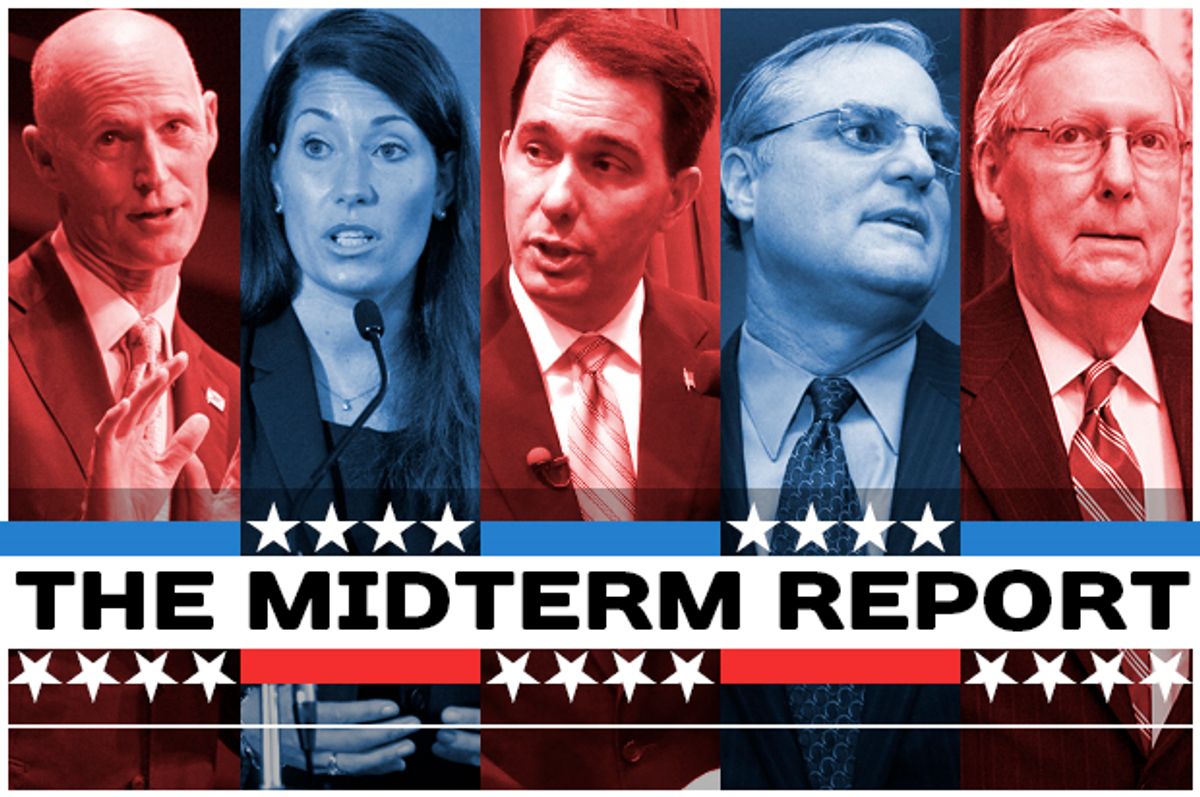Heading into the 2014 cycle, it was clear very early on that certain seats were guaranteed to be fiercely competitive. Sen. Mitch McConnell of Kentucky remained as unpopular as ever. Unlike in her 2008 race, Sen. Kay Hagan of North Carolina wouldn’t benefit from a pro-Obama spike in turnout this year. Sens. Mary Landrieu of Louisiana, Mark Pryor of Arkansas, and Mark Begich of Alaska were each sure to face formidable challenges in deep-red states.
As happens every cycle, though, a few once-dormant races have emerged as key battlegrounds. Republican State Sen. Joni Ernst is giving Democrats heartburn in Iowa, where Rep. Bruce Braley had been seen as a relatively safe bet to succeed retiring Democratic Sen. Tom Harkin. Similarly, few observers thought Democratic Sen. Mark Udall of Colorado was in serious jeopardy until Rep. Cory Gardner launched a spirited challenge in March. In Kansas, meanwhile, Sen. Pat Roberts could become the first Republican to lose a Senate race in the state since 1932. This week brought yet another jolt: a second poll showed South Dakota Republican Senate nominee Mike Rounds surprisingly vulnerable in that state’s three-way race, and Democrats announced a $1 million investment in the contest.
With just 25 days before Election Day, it’s surely too late for voters to throw us yet another curveball, right? Not so fast – we may yet see another late-stage twist in Georgia, where Republican David Perdue and Democrat Michelle Nunn are facing off to succeed Republican Sen. Saxby Chambliss.
Georgia is a bit different from the unexpectedly competitive races in Iowa, Colorado, Kansas, and South Dakota. Once Chambliss announced his retirement, forecasters saw Georgia as one of the few states where Democrats had a realistic shot at picking up a GOP-held seat. The state’s rapidly shifting demographics have loosened the GOP’s grip on the state; President Obama managed to win 46 percent of the vote in Georgia in 2012, even though he didn’t seriously compete there. And for much of the year, the contest between Perdue and Nunn seesawed.
But shortly after Labor Day, a new dynamic seemed to develop. Perdue’s situation became roughly analogous to that of North Carolina’s Hagan: he built up a lead that was modest but consistent. The race never got away from Nunn completely, but she clearly needed a #gamechanger.
And now, one may have been delivered. Late last week, Politico reported that in a 2005 deposition concerning his stormy nine-month tenure as CEO of textile company Pillowtex, Perdue said he was “proud” to have spent “most of my career” outsourcing jobs. It was an impolitic thing to say in any case, but even more so in a state where the unemployment rate is 8.1 percent, well above the national 5.9 percent rate. The only poll released since Politico’s report was partly conducted before Perdue’s remarks came to light. But the poll, from Survey USA, showed Perdue with a statistically insignificant 46 to 45 percent lead over Nunn.
Even better news for Nunn came in the form of an analysis from the New York Times’ Nate Cohn, who noted yesterday that most polls in the race have assumed a lower African-American turnout in Georgia than in 2010; given the state’s high-profile Senate and governor’s races this year, that hardly seems plausible.
If Nunn is to prevail, however, it won’t be enough to simply win more votes than Perdue on November 4. If neither candidate reaches 50 percent on Election Day, the race is headed to a January 6 runoff – raising the possibility that Senate control won’t actually be decided until after the 114th Congress is sworn in.
In other midterms news:
- The courts dealt big setbacks to voter identification laws last night. Citing voter ID laws’ disproportionate suppression of minority voters, a federal district court struck down Texas’ law, while a divided Supreme Court overturned Wisconsin’s ID requirement. In the Wisconsin case, conservative justices Antonin Scalia, Clarence Thomas, and Samuel Alito dissented from the decision to overturn the requirement. The decision could have significant implications for the state’s closely-watched gubernatorial race. Polls show that the contest between GOP Gov. Scott Walker and Democratic challenger Mary Burke is a dead heat.
- FiveThirtyEight’s Harry Enten writes that the Senate race in Alaska is slipping away from Democratic Sen. Mark Begich. Recent polling shows GOP challenger Dan Sullivan holding a lead in the mid-single digits, and FiveThirtyEight’s model now gives Sullivan a 76 percent chance of victory. Sullivan’s apparent lead – polling in the state is notoriously tricky – comes despite Begich’s much-heralded ground game. But Enten points out that the fundamentals of the contest – it’s a midterm year, Alaska is a red state, and President Obama’s approval rating is nothing to write home about – may matter more than Begich’s assiduous efforts to reach out to voters.
- Has Martha Coakley righted her ship in Massachusetts? A string of recent polls showing Republican Charlie Baker leading Coakley in the state’s gubernatorial race had Democrats fearing a repeat of 2010, when Coakley lost the race to fill the late Sen. Ted Kennedy’s seat in a stunning upset by Scott Brown. After a series of other polls showing Coakley with a small lead, new Boston Globe poll finds Coakley with a five-point lead, suggesting that the race is trending back her way. But the Globe poll – which shows Coakley leading 39 to 34 percent – indicates that many voters remain undecided, a finding that dovetails with other polls. According to RealClearPolitics’ database, Coakley has only exceeded 45 percent support in one poll since July.

Shares